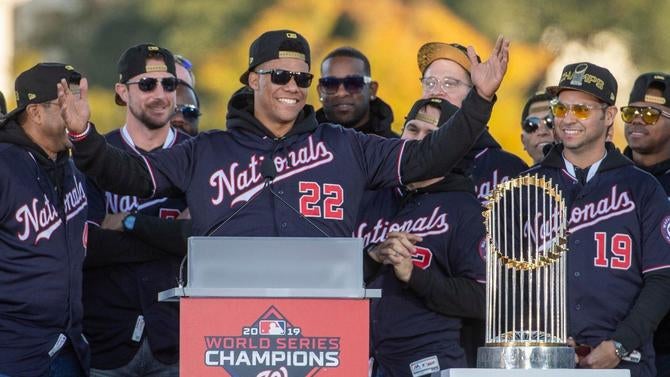The 2020 Major League Baseball season is on indefinite hiatus because of the threat that is the novel coronavirus (COVID-19). Spring training was shut down in March and Opening Day has been pushed back indefinitely. When will baseball return? No one knows for sure, though MLB hopes it will be early July.
Between now and Opening Day my fellow CBS Sports MLB scribes and I will bring you a weekly roundtable breaking down, well, pretty much anything. The latest news, a historical question, thoughts about the future of baseball, all sorts of stuff. Last week we discussed the most unbreakable record in history. Now on to this week's roundtable.
Is an 82-game season enough to crown a legitimate champion?

R.J. Anderson: Absolutely. Teams can play only the schedule they're given; in this case, that means 80-something games instead of 162. Beyond that, I'm not sure I accept the argument that winning the World Series this season would be less impressive than during a normal year. These are human beings; they have fears and anxieties stemming from the pandemic and their unusual working conditions the same as the rest of us. If you really want to argue about the legitimacy of a World Series winner, then the Astros and Red Sox have provided you with plenty of ammunition to use elsewhere. Let this year's champions (if such a thing is possible) be.
Dayn Perry: I have no problem calling it legitimate. Quite often, the objective best team in the league doesn't wind up winning the title because of the small-sample size weirdness of playoff baseball. That doesn't prevent us from recognizing, say, the 83-win 2006 Cardinals as champs or the negative run differential '87 Twins as champs. In that light, there's nothing outlandish about an 82-game sample to determine the playoff field. All teams know that individual regular season games will matter more in 2020, so they should treat those games accordingly.
Matt Snyder: We're always going to remember how weird this season looks, no matter how far into history we go, but a championship will be rightfully viewed as legitimate in hindsight. The 1981 season was broken up into two pieces and if you combined them, the Reds had the best record in baseball. Yet they didn't even make the playoffs. We don't look at the Dodgers' 1981 World Series championship in a vastly different light. The poor Reds are left as nothing more than a trivia question that'll make younger fans who didn't know about this start saying, "wait, what? How? What?"
Initially, though, there will be a wave of "this was a fluke" over social media, broadcasts and elsewhere. The line of thinking is basically going to be, "did my favorite team win it all?"
If the answer is yes, it totally counts and is legitimate.
If the answer is no, it was a fake season and that title is stained.
And it's going to be pretty hilarious to watch as a bystander.
Katherine Acquavella: Yes. To echo what's been said already, this is uncharted territory for Major League Baseball. There have been shortened seasons before, but none like the circumstances now with the return of baseball having become a public health and safety issue. An 82-game season would bring with it new elements (closer races, possible Cinderella runs, ramifications of division realignment) to a postseason race, but I don't think any are reasons not to view the 2020 World Series champion as legitimate. If anything, an abbreviated season doesn't allow for more time for teams to work out any lineup or rotation flaws or for teams to rely on a second-half turnaround. Either way, 162 or 82, you still have to win games.
Mike Axisa: Part of me wants to argue the other side because everyone else said yes, but I can't do it. Of course it's legitimate. Truth be told, MLB's postseason is as much about making money as it is crowning a legitimate champion, perhaps even moreso. That's why they keep adding rounds and changing the format. The league wants to make more money, not make it more legitimate. The 82-game season will present unique challenges. Weird things happen in small samples -- pretenders can turn into contenders, someone could flirt with .400, etc. -- and the pandemic will create its own stresses, but every team will play under the same rules and in the same adverse times. The players are well-paid but they're still human, and playing through a global crisis can't be easy. This season will be (very) different, but different doesn't mean illegitimate.






















